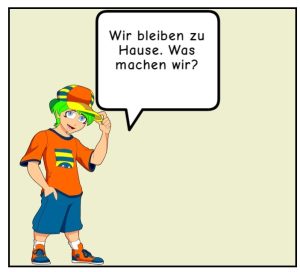4.5 Spaß mit meinen Freunden – Was machen wir?

Hallo allerseits!
Zum Aufwärmen machen wir unseren Tagesminiplausch und eine Wiederholung.
Wiederholung
In the previous lesson, you learned how to describe the size of your Freundeskreis and how to say how often you hang out with your friends. Let’s review what you have learned.
Wie groß ist dein Freundeskreis? Wie oft trefft ihr euch? Answer the questions in your written journal, noting the size of your Freundeskreis and how often you meet up with your friends (wenig oder oft).
 Lektionsüberblick
Lektionsüberblick
As you can see from the chart, hanging out with friends (soziale Kontakte knüpfen/pflegen = making and maintaining social contacts) is a number one priority for today’s youth. When you make plans with friends, you decide what you are going to do, when you are going to do it, and where you will meet. The next two lessons will prepare you to make plans for fun. In this lesson, we will discuss how to convey the enjoyment of hanging out with friends and we will look at kinds of typical activities. In the end, you will be able to 1) recognize the language of fun, 2) name some fun going out activities, and 3) name some fun staying in activities.
1) Reden über Spaß
Hanging out with friends should be easy and fun, talking about fun in German ist not always easy. Not because Germans do not know how to have fun, but because, in German, nothing *is* fun. You either have fun (Spaß haben) or something is fun for you (das macht mir Spaß). The closest you can get to saying that something *is* fun is to say “that was fun” (das war lustig). If you try to use lustig with *is*, then the meaning shifts.
das ist lustig = that is funny
…which brings us back to Spaß haben and Spaß machen.
Let’s look at some examples of ways to say you have fun watching Netflix. Notice when haben is used and when machen is used.
|
Netflix-Schauen macht mir Spaß. Ich habe Spaß beim Netflix-Schauen. |
 |
Let’s look at some examples of ways to say you have fun at concerts.
 |
Konzerte machen mir Spaß.
Ich habe Spaß beim Konzert. |
The focus of the above examples was Ich/mir. But sometimes having fun is a we thing. Practice these sentences that use wir (we) and uns (us).
Jetzt bist du dran!
2) Was machen wir? – Ausgehen!
Read and listen.
 |
Kleiner Hinweis German is pretty efficient! Wir gehen aus can mean
*In second year German, you will learn the other way to say “we will go out”.
|
Jetzt bist du dran!
Frankfurt am Main im Blickpunkt

Das Museumsuferfest in Frankfurt am Main findet jedes Jahr am letzten August-Wochenende statt. Über 30 Museen am Main öffnen ihre Türen für Besucher. Es gibt viele kulturelle Veranstaltungen wie Musik, Theater und Tanz. Auf dem Festival gibt es auch Essen aus verschiedenen Ländern. Am Ende des Festes gibt es ein großes Feuerwerk über dem Main. Das Fest zieht jedes Jahr viele tausend Besucher an.
The Museumsuferfest (Museum Embankment Festival) in Frankfurt am Main takes place every year on the last weekend in August. Over 30 museums along the Main River open their doors to visitors. There are many cultural events, including music, theater, and dance. The festival also features food from various countries. At the end of the festival, there is a grand fireworks display over the Main River. The festival attracts many thousands of visitors every year.
3) Was machen wir? – Daheim bleiben!
Read and listen.
 |
Using your knowledge of cognates and previous German experience…
Jetzt bist du dran!
Zum Schluß

*As you conclude this lesson, don’t forget to check Canvas!*

Media Attributions
- 1010-1020 banner long large reduced
- Photo of couple by pexels-cottonbro-4009401
- Photo of concert by pexels-maegregorio-1776151
- “Wir gehen aus” Comic made at www.MakeBeliefsComix.com
- Photo of Museumsuferfest by Scott, Flickr, CC BY-NC-SA 2.0.
- “Wir bleiben zu Hause” Comic made at www.MakeBeliefsComix.com
- Private: confidence scale_large horizontal_updated

